Crime novels. Westerns. Most of us think of these two genres as grossly different: one tends to feature detectives-types solving mysterious felonies, while the other prefers to focus on rough-riding cowboys behaving badly. Crime emphasizes the keen thinking of its protagonists, a tradition born maybe from Sherlock Holmes himself, while westerns emphasize a certain nostalgia for the frontier past. And yet on a deep structural level, these two divergent genres share a surprising amount.
Both are about the triumph of good over evil. Early in a novel of either genre, we will see our protagonist encounter an injustice, usually the victim of crime (who may or may not still be breathing). Both novels will end when the scales of justice have finally been righted; the perpetrators of evil have met their due punishment. In a crime novel, justice usually comes in the form of a court of law. In the western, justice tends to be delivered by a bullet through the heart.
Both genres are propelled by strong-willed protagonists who rub the establishment the wrong way. The crime novel’s detective will often push the boundaries of investigative practices, even after her boss threatens her job. The western’s protagonist is usually someone with little faith in the legal system to begin with; during the quest for justice, the law usually levels its sights on our hero.
A few talented novelists have seen the overlaps between the genres and given us stories that attempt to mend the best elements of crime with the best elements of westerns to build novels that are wildly entertaining. Here are nine of the best crime-westerns to date:
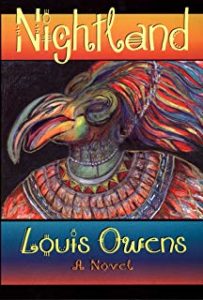
Louis Owens, Nightland (1996)
Owens’ funny, dark, and socially conscious crime-western opens with a familiar device: our protagonists find a dead body and a suitcase containing a million dollars. But from there, Owens pushes his mystery in new, fascinating directions. Our protagonists are culturally Cherokee, as was Owens himself, and their experience after finding the crime and cash turns on encounters with spirits, shapeshifters, and whites with suspicious agendas. A pioneer of the field of Native American Studies, Owens was Director of Creative Writing at the University of California, Davis, at the time of his death in 2002. If you like this one, also be sure to read Owens’ other mysteries, The Sharpest Sight and The Bone Game.
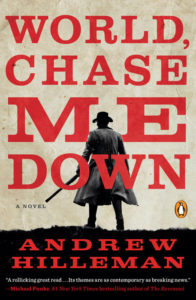
Andrew Hilleman, World, Chase Me Down (2017)
This suspenseful crime-western is about the first successful kidnapping for ransom in U.S. history—a true story. In 1900, Pat Crowe, an out of work butcher, kidnapped the teenage son of a wealthy Omaha businessman, and ransomed him for $25,000 in gold. The novel moves supplely through time to tell this riveting tale of a less-than-perfect crime and the globe-trotting escape that followed.
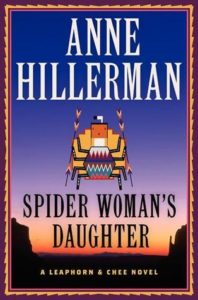
Anne Hillerman, The Spider Woman’s Daughter (2013)
Tony Hillerman may be the most widely read practitioner of the crime-western genre, but his daughter, Anne, is taking the genre in new, exciting directions. This novel features a husband and wife investigative team and a ruthless killer who will stop at nothing to thwart justice. Seeped in Navajo mythology and the plotlines of her father’s novels, The Spider Woman’s Daughter shows that Anne Hillerman is now the barer of the family torch.
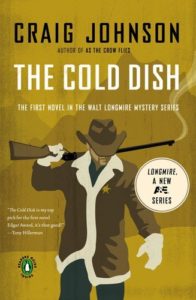
Craig Johnson, The Cold Dish (2006)
Before Johnson started writing the series of novels that would become the hit show Longmire, he worked as a ranch hand in Wyoming. No surprise then that his crime-westerns glow with singular authenticity. The Cold Dish was the book that launched his career; it introduces readers to Walt Longmire, a Wyoming sheriff and classic western hero (though born a hundred and fifty years too late), who is tasked with solving one last murder before his retirement. Eleven novels later, Longmire is still fighting for justice.
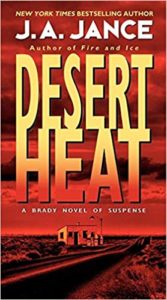
J.A. Jance: Desert Heat (1993)
The first in the Joanna Brady series of novels, J.A. Jance’s protagonist is a mother and wife who discovers her husband, a sheriff’s deputy, shot in the Arizona desert. When he later dies of his wounds, police claim it was suicide, the fallout from his decision to go dirty and work as a hitman for a drug cartel. But Joanna Brady isn’t buying that story. For her daughter’s sake, she must work to solve the murder of her husband—and clear his name—even as it becomes clear she can’t trust those in power.
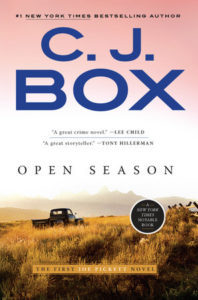
C.J. Box, Open Season (2001)
Joe Pickett is a game warden in Wyoming, and not a popular one. When an outfitter is found dead and the local police have a quick explanation, Pickett continues to investigate alone. He uncovers a startling connection between the murder, an endangered species, and a planned oil pipeline. The more he learns, the greater the danger he faces. Joe Pickett is a classic western hero in the pursuit of justice, and Open Season is the first of 19 books to date featuring the character.
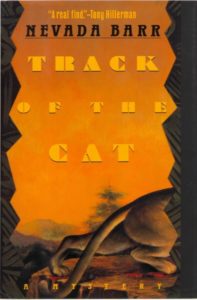
Nevada Barr, Track of the Cat (1994)
Anne Pigeon, the hero of Nevada Barr’s longstanding series of award-winning crime-westerns, is a national park ranger, and each book is set in a different national park. The first in the series, Track of the Cat, is about the gruesome murder of a fellow ranger, which is staged to look like the work of a vicious mountain lion. Pigeon will have to prove the truth, while also helping protect the dwindling population of lions the park is intended to safeguard.
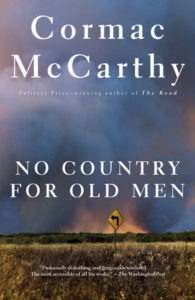
Cormac McCarthy, No Country for Old Men (2005)
Llewellyn Moss is hunting antelope when he discovers a drug deal gone wrong. When he takes two million in cash from one of the shot-up vehicles, he sets off a series of events that seem certain to take his life. Not even the sheriff relating the story will be able to contain the evil unleashed. From the author of one of th
e most studied westerns ever written, Blood Meridian, comes a literary page-turner about a crime gone wrong in the American Southwest.
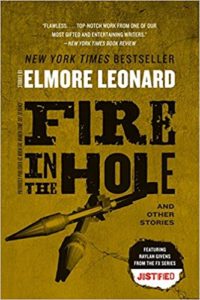
Elmore Leonard, Fire in the Hole (2001)
This collection of short stories displays Leonard’s mastery of the crime genre, with his signature ear for character-building dialogue. The title story, featuring a Stetson-wearing US marshal named Raylan Givens, is the basis for the hit TV show Justified. While our other titles have been set under western skies, Fire in the Hole features a western hero transplanted eastward to contemporary Kentucky. The result is a hugely satisfying mashup of western and crime tropes.

















